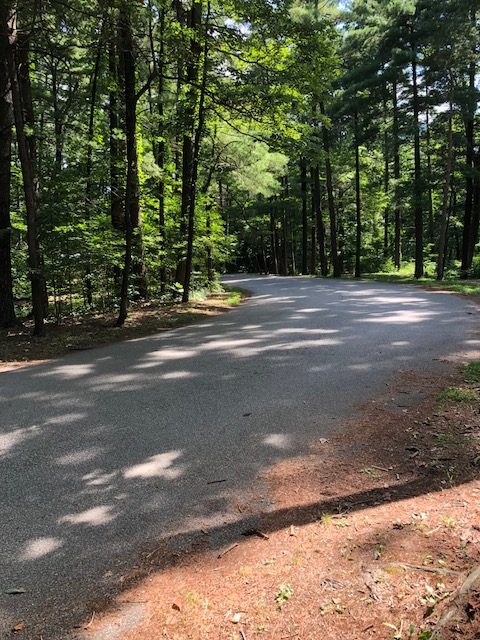by Donna Poole
You wouldn’t guess it to look at him, but this almost seventy-two-year-old country preacher I’m married to has a restless streak a country-mile wide. At least it used to be a country-mile wide; maybe it’s only a half-mile wide now. It shows up in different ways. He gets a certain glint in his eyes.
Then he says, “I wonder where this road goes? You want to follow it and find out?”
He knows I do. I always do, except for that one time.
We were in Lost Nation, a game preserve area close to our home, when he asked his question.
“No, I don’t want to. That’s not even a road! Please, don’t….”
But it was too late. Hoping, as he always did, that our 1973 Pinto station wagon would magically transform itself into a Jeep or better yet a four-wheel-drive truck, John had already started down the “road” in Lost Nation that looked more like someone’s overgrown driveway. We swerved and bumped down the path that grew more overgrown and less road-like by the minute.
“I think we should turn around or back out of here,” I suggested.
“There isn’t anywhere to turn around, and I don’t want to back out of here. Besides, we don’t know where this goes yet.”
We never did find out. Finally, we could go no farther, and John had to begin backing out, considerably harder than driving in.
We were close to where we’d started when the Pinto sunk in a patch of mud.
“Help me push the car out.”
We pushed; we struggled. John remained optimistic. I’m the family Pollyanna, but those tires were half-buried in mud. Getting stuck in the mud in an isolated game preserve in the days before cell phones wasn’t fun.
John found an old fence post. “I’ll try to lift the car up with this while you push.”
I don’t remember now if either of us prayed. Let’s imagine we did. Whether we did or not, God was merciful. He let us wait long enough to realize we were in trouble. John hiked back to the road and flagged down a truck,
The truck driver hooked on a chain and pulled us out of the mud. He refused pay, smiled at John, and politely said, “Probably not the best place to try to drive a Pinto.”
I don’t remember what I said to John. Let’s imagine I was a good wife and didn’t say anything.
John’s restless streak used to show up in other ways too. He often got requests from churches looking for pastors. Would he come preach for them? He went every time and after a favorable vote asking him to come as pastor went through agony trying to decide if he should leave our church.
Finally, our church board asked to meet with John. Bud, our oldest deacon, spoke for the board. “Pastor, you’re driving us crazy! We never know if you’re going to leave or stay! Please make up your mind one way or the other.”
That time of many churches asking John to come preach and slowed and stopped. Many years passed. We didn’t get another request from a church looking for a pastor until John was seventy. It came from an adorable church with a small congregation near the shores of Lake Michigan. If you don’t live in Michigan, you may not know that many Michiganders drool at the thought of living near the lake. Including me.
John wasn’t tempted. He wrote the church a sweet note declining the request for him to come preach with the possibility of being considered as their pastor, smiled at me, and tossed the letter in the garbage. He didn’t tell anyone at our church. I confess, I got on the internet and researched the beautiful area; I’ve always hoped to someday live closer to the lake. But the beautiful road that beckoned me to the lake couldn’t compete with the heart of the people we love right here. Most important, John knew God wasn’t calling him to go down that road. I’m glad I don’t have to figure that out for him, and he doesn’t have to for me. We each must listen to that still small voice in our hearts and choose what road to take.
Still, I’m pretty sure it wasn’t God calling John to drive down that forsaken path in Lost Nation. That is one back road adventure he never tried again.
We drove back to the scene of the crime today so our daughter, Kimmee, could take pictures for my blog article.
“Dad, you drove down that? But it isn’t even a road!”
Exactly, Kimmee.
“Well, it was wider back then,” John said, sounding defensive.
Not by much it wasn’t.
“Take a picture of that sign, honey,” I said. “The one that says no vehicles.”
The sign makes me guess there must still be people with a restless streak a mile-wide looking for adventure. Too bad the sign hadn’t been there all those years ago. But then I wouldn’t be taking this backroad adventure with you.
















































